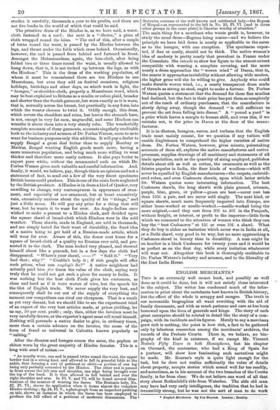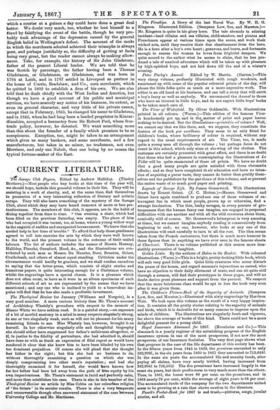ENGLISH MERCHANTS.* Tins is an extremely well meant book, and
possibly as well done as it could be done, but it will not satisfy those interested in the subject. The writer has condensed much of the infor- mation in print about the merchants best known in British history, but the effect of the whole is scrappy and meagre. The truth is our mercantile biographies all want rewriting with the aid of family documents, and with as much patience and care as has been bestowed upon the lives of generals and kings. The story of each great enterprise should be related in detail like the story of a cam- paign, with its incidents and its figures. Merely to say a merchant grew rich is nothing, the point is how rich, a fact to be gathered only by laborious researches among the merchants' archives, the records of the Probate Courts. There is, we believe, no bio- graphy of the kind in existence, if we except Mr. Vincent Notte's Fifty Years in both Hemispheres, but his chapter on Ouvrard, the contractor, who had a King of Spain for a partner, will show how fascinating such narratives might be made. Mr. Bourne's style is quite light enough for the task, but he does not realize sufficiently the value of details about property, accepts stories which sound well far too readily, and sometimes, as in his account of the two branches of the Cantle family, is far from clear. We do not believe one word of all that story about Rothschild'Sride from Waterloo. The able old man may have had very early intelligence, the tradition that he had is irresistibly strong, but he was not the sort of man to do work
* .English Merchants. By Fox Bourne. London ; Bentley. which a courier at a guinea a day could have done a great deal better. We doubt very much, too, whether he lent himself to a fraud by falsifying the event of the battle, though he very pro- bably took advantage of the depression caused by the general English belief in Wellington's defeat. The account of the mode in which the merchants selected achieved their triumphs is always poor, and perhaps justifiably so, the difficulty of getting at facts being very great, but the reader cannot always be making allow- ances. Take, for example, the history of Sir John Gladstone, father of the present Liberal leader. We are told that he was Scotch by parentage, the father having been a Thomas Gladstanes, or Gledstanes, or Gladstones, and was born in 1764 at Leith, and in 1787 settled in Liverpool as partner in the house of Currie, Bradshaw, aud Co., corn merchants, which he quitted in 1802 to establish a firm of his own. We are also told that he dealt chiefly with the West Indies and America, but though we have a good account of his public and municipal services, we have scarcely any notice of his business, its extent, or even its general character, and very little of his private career, except that in February, 1835, he changed his name to Gladstone, and in 1816, when he had long been a landed proprietor in Kincar- dineshire, accepted a baronetcy from Sir Robert Peel, whose free- trade policy, however, he detested. We want something more than this about the founder of a family which promises to be so conspicuous. Exception, too, might be taken to an arrangement which gives us many bankers, and some merchants, and a few manufacturers, but takes in no miner, no tradesman, not even Morrison, and only one Nabob, that one being by no means the typical fortune-maker of the East.





































 Previous page
Previous page